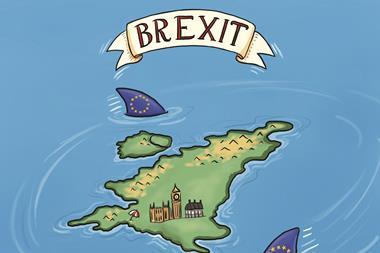What would Brexit mean for science and businesses in the UK? Chris Leigh and Mike Galsworthy discuss their views on the EU referendum

To leave…
Science will continue to flourish if the UK votes to leave the EU, says Chris Leigh who is writing on behalf of Scientists for Britain
The UK has a long and proud history of world-leading scientific discovery and innovation. And, in an increasingly competitive and technologically advanced world, our talented and industrious scientists continue to punch way above their weight in terms of scientific publications and their international impact.
Indeed, a recent Unesco science report reveals that despite having only 0.9% of the world’s population and 3.3% of its scientific researchers, we generate 6.9% of global scientific publications and 15.1% of the world’s most highly-cited scientific papers.
I believe that the UK science community will continue to outperform in the event that the British electorate decide that our future lies outside of the EU project.
‘EU’ funding for UK research
The simple truth is that EU research mechanisms (known as framework programmes) support just 3% of UK research and development activity, as was revealed in a recent Royal Society report. Furthermore, figures from the Organisation for Economic Co-operation and Development (OECD) and EU in 2014 show that 97% of European R&D as a whole occurs outside of these same EU-funded research networks. Given the nominal contributions (our own recycled and EU-branded money, of course), one can only imagine that some pro-EU commentators must have little faith in our research community if they believe that a 3% drop in R&D funding would constitute any form of disaster.
In terms of UK businesses, it probably comes as no surprise that the EU plays even less of a role in terms of funding. Indeed, the Royal Society report indicates that UK businesses attracted 18% of total UK funding from the most recent framework programme, known as FP7, which ran from 2007–2013.
Given that around 45% of UK R&D is funded by businesses, the figures suggest that the EU contribution to the R&D activity of our business sector came in at just 1.2%. Despite this, the EU Commission currently has the right to legislate against whole sectors of our research base, as was demonstrated by the Clinical Trials Directive of 2001, which caused such damage to smaller biomedical research teams across the UK.
Future relationships
Given that EU science networks account for such a small proportion of UK and European science, it seems wholly implausible that a ‘leave’ vote would lead to scientific isolation, as some doomsayers predict. The fact that the US is our most important scientific partner must surely prove that international collaboration does not require political union. Our involvement in high-profile intergovernmental projects such as Cern, EMBL, EUMETSAT and the European Space Agency is assured, and is testament to the reality that our involvement in European science would continue.
That said, if the terms were acceptable, then there is no logical reason why the UK could not participate in the EU’s European Research Area as an associate member, on the same pay-in basis to which 14 non-EU countries have agreed.
Of course, the question arises as to whether we would have the same influence as an associated member of Horizon 2020 (the current framework programme) as we do now. The answer lies in article 7 of the regulations, which states that associated countries can participate under the same conditions as member states. Scientists from non-EU countries are also eligible to sit on the governing body of the European Research Council, such as Rolf Zinkernagel (Switzerland) from 2005–2011 and Daniel Dolev (Israel) from 2011–2015. Furthermore, the newly established Scientific Advice Mechanism, whose purpose is to provide the EU commission with scientific advice on policy issues, makes provision for the inclusion of scientists from non-EU countries.
Freedom of movement
As scientists, we fully recognise the importance of researchers and academics being able to travel between countries for the purposes of research and collaboration. However, we refute the suggestion that such movement is in any way contingent on being part of a political union. Indeed, research by the National Bureau of Economic Research in 2012 revealed that independent countries with strict immigration controls, such as Australia, Canada and the US, recruit a greater percentage of foreign researchers than the UK, France and Germany. The research also reveals that the primary destination for UK-trained scientists is not the EU, but is the US, Australia and Canada – none of which we have a free movement agreement with.
At the end of the day, the impact on UK science is but a small part of a much wider debate surrounding this referendum. This is a debate that goes to the very heart of who we are, and who we want to be governed by. It is therefore essential to remind ourselves that the forthcoming referendum is not a vote on our membership of a science club: it’s a vote on whether we wish to remain part of a political union that has openly declared its federalist ambitions, none of which would favour Britain’s advancement, scientifically or otherwise.
…or not to leave
Funding isn’t the only benefit UK science gains from EU membership, says Mike Galsworthy, programme director of Scientists for EU
The EU is a science superpower, producing 34% more output than the US – and the gap is growing. We also produce more researchers than China (in second place), and the US (in third). The UK sits in the driving seat of this vibrant science hub.
In April, the House of Lords science and technology committee released its long awaited report on EU membership and UK science. It declared that the ‘overwhelming balance of opinion’ of UK scientists greatly valued EU membership. The Lords report noted that of over 70 written submissions received, only two were for leaving: the campaigns Vote Leave and Scientists for Britain.
In this referendum debate, the science community has made its voice heard loudly in letters to newspapers and in polls. Every minister for universities and science for the past 25 years has supported remaining in the EU. Over 100 university vice chancellors are for remaining, and there is not one vice chancellor in the entire UK who has publicly declared support for leaving.
The last three presidents of the Royal Society have spoken up for EU membership – as have 150 of their members. The Campaign for Science and Engineering (CaSE) open survey found 93% of researchers agreed that the EU was a ‘major benefit’ to UK research. A Nature poll found that 83% of UK researchers would vote to remain.
Why is there such strong opinion in favour of the EU? I would suggest three key factors: the EU science programme; policy harmonisation; and the freedom of movement agreement.
The EU science programme
Much is made of the lion’s share of funding that the UK wins from the EU science programme. But the real key factors here are the networking, impact and growth. Our funds competitively won from the EU are irreplaceable by national funds because they concern shared infrastructure and multinational collaborations. The common pot of money means we can put together the teams we want, regardless of borders. Studies show that international collaborations have 40% more impact than domestic-only research. According to Unesco data, 62% of UK scientific outputs are now international, compared to 39.6% for the US. It is that dynamic which has driven us to overtake the US for science productivity recently, according to a 2013 government report. Networking is crucial.
Furthermore, while our own national funding has stagnated at the bottom of the G8, the current EU budget for science is more than double what it was a decade ago. This has meant that 73% of the increase in funding for science research in universities from 2007–2014 is attributable to this growing EU source, which, at 17% of science funds to UK universities today, is equivalent in size to a UK research council.
Policy harmonisation
As our international networking grows, it becomes vital that we are operating under the same methods, scientific practices and standards – from open access and open data to regulations like Reach. Balancing innovation and industry with sufficient health and environmental safeguards is complex enough as is, without adding a layer of differences between 28 countries.
There is clear value in being fully engaged in forming harmonised policy in a rapidly changing world. If we were to leave the EU and pull out our government and 73 MEPs, we certainly lose the capacity not only to shape the EU science programme, but also the broader research and innovation framework that impacts both academia and industry. That is something that the Lords report makes abundantly clear.
A large talent pool
Our freedom of movement arrangement with the EU allows us to hire from a talent pool of 500 million people without the obstructions of a visa system. As detailed in the CaSE immigration report, this is highly useful for our universities, but also it is crucial for our small innovative companies that do not have the administration capacity to navigate complex visa systems.
Those advocating that we leave the EU have suggested that freedom of movement sets up discrimination in hiring that reduces our ability to bring in non-EU talent. However, leaving the EU is no tidy solution to fix our government’s self-imposed restrictions on hiring non-EU scientists.
If we were simply to loosen those high-skill visa restrictions we would end current ‘discrimination’, but generate no net immigration increase; it’s simply replacing EU scientists for non-EU scientists.
Compare this with pulling out of the single market in order to drop freedom of movement, followed by imposing our bureaucratic visa system across the board. That’s hardly using a nutcracker to crack a nut.
The EU currently provides a highly successful vehicle for UK research networking, resource sharing, policy influence and hiring of talent. It is a facilitator of our global reach, impact and attractiveness to talent. As the EU becomes bolder in investment and vision, UK scientists want to hold on to the driving wheel.
The global consequences of Brexit
We asked chemists from around the world for their views on the impact of the EU referendum
US
I see no upsides for science (chemistry) in the UK or elsewhere around the world – and particularly within the EU – from a UK exit from the rest of Europe. It’s out-and-out madness even to contemplate such a move, and the consequences would be dire for UK universities if it were to come to pass.
The list of downsides is endless. Academic collaborations, the lifeblood of science nowadays, would be put at jeopardy all across Europe. Academics in UK universities would be denied lucrative sources of funding for research from the EU. UK universities would be put at a considerable disadvantage when it comes to attracting top-notch professors and students from the rest of Europe and beyond. The commercialisation of research through start-ups would inevitably suffer. And so it goes on.
I have spoken to nobody on this side of the Atlantic who sees ‘Brexit’ as anything other than putting both British and European science at considerable risk for no good reason at all. One person commented it would be like separating the science done in California from the rest of the US: it’s not something one would wish to consider doing in a month of Sundays.
Not so long ago, Scottish universities were under threat (and may already have suffered at the hands of uncertainty) from the independence movement in Scotland. Let’s hope that there have been some lessons learnt from that episode of playing with fire.
One final thought. European science would be much weakened without access to British science. The international language of science is English, and if the UK departs in June, the Republic of Ireland would be the only English-speaking country remaining in the EU. Continental Europe would be weakened and there would be negative feedback to the UK.
The uncertainty is bad enough; the possibility of an exit does not bare contemplating. Shooting oneself in the foot makes no sense whatsoever.
Fraser Stoddart, professor of chemistry, Northwestern University
It would be sad for the UK to back out of the EU and away from a more direct participation in cultural, scientific and economic matters within Europe.
Specifically with respect to science, I believe that the UK benefits significantly from its participation in the EU. Such benefits include the exchange of scholars (for example postdocs coming to the UK with funding from the EU), and opening up training opportunities for young UK scientists in good research centres across mainland Europe.
The EU also provides opportunities for funding science and, especially going forward, it seems that scientists can use all the funding mechanisms they can get. More broadly, I believe that the UK has a lot to contribute in terms of its unique history and culture to all things ‘European’.
T Don Tilley, professor of chemistry, University of California, Berkeley
Canada
A ‘Brexit’ would definitively have implications for Canada in general, since deals signed with the EU could have to be signed again with the UK, depending on the terms of any potential changes. One can imagine that research in UK would be weakened due to the more complicated situation for UK scientists to find funds or set up international collaborations, given the fact that UK gets more funds for research than it financially contributes to EU. Moreover, it would make it difficult to impossible for the UK to influence European research programmes any more.
Personally, I do not believe the UK leaving the EU will have much impact on chemistry in Canada, at least in academia. There would be consequences for big consortiums where UK is involved as European partner, but scientists from Canadian universities would easily find other collaborations with scientists in other countries.
Thierry Ollevier, chemistry professor, Laval University
UK
To do the best science possible, we are a community who works collaboratively. Staying in the EU is only sensible. That’s without considering number of world-leading projects headed by UK groups, funded through the EU.
Serena Corr, lecturer in physical chemistry, University of Glasgow (via Twitter)
I cannot see that any UK government would discourage the best students from anywhere in the world entering our universities as a result of leaving the EU. Similarly, I doubt that the best students, as well as the best scientists in the world, would not want to come to the UK just because we were no longer in the EU.
Anthony Lipman, Chelmsford
Spain
Once you’re out, you’re out. It would be a loss, and a shame, if [UK voters] choose Brexit.
Marcel Swart, research professor at the Institute of Computational Chemistry Catalysis, University of Girona (via Twitter)
South Korea
No immediate impact on the far East, even most of Asia.
Cafer Yavuz, professor at the Korea Advanced Institute of Science and Technology (via Twitter)
Hong Kong
The impact to chemical sciences and higher education on Hong Kong and China, should the UK vote to leave EU, is not expected to be too obvious, at least in the short term. The UK, with a different currency, appears [to Hong Kong] to be somewhat independent from EU anyway. However, if the UK leaves the EU, the chemical sciences in particular, and science and technology in general, will suffer profoundly. The employment of PhD graduates, the funding of research programmes, and many other research aspects will be badly influenced.
Henry Wong, dean of science, Chinese University of Hong Kong
Australia
UK chemistry researchers and the UK scientific community in general will be deprived of access to some of the greatest researchers in Europe if the UK withdraws from the EU. It is not widely appreciated by the general public how much funding flows from the EU to support UK research. My eyes were opened when I had the privilege of being a regular collaborator in many European framework and Marie Curie programmes between 1992–2004.
Andrew Holmes, president of the Australian Academy of Science












No comments yet